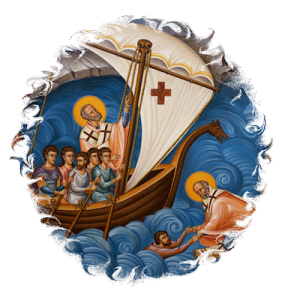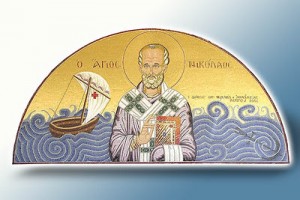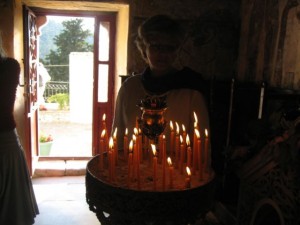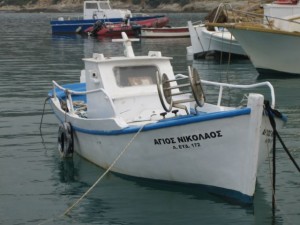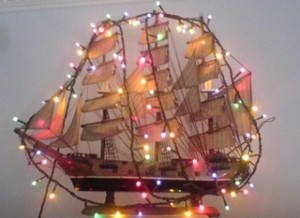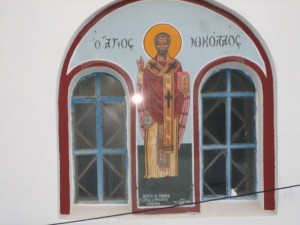Agios Nikolaos, the patron saint of sailors in Greece
Saint Nicholas, Greek Agios Nikolaos, worked in the first half of the 4th century as Bishop of Myra in the Lycia region of Asia Minor, then part of the Roman and later the Byzantine Empire, today’s Demre, which is a small town about 100 km southwest of Antalya is in Turkey.
Nikolaos is said to have been a good bishop. He came from a rich family and helped poor people wherever he could. He had almshouses built and orphanages for children. In the harbor of Myra he had a house built for the old sailors who could no longer go out to sea. Nikolaos of Myra was and is the most revered saint of the Orthodox Church.
In the early 8th century the cult reached Italy, which at the time still had close ties to the Eastern Roman-Byzantine Empire, and soon achieved great popularity. The cult of St. Nicholas came to German-speaking countries in the 10th century, probably through the Empress Theophanu, the Greek wife of Otto the Second.
In Greece, patron saint of fishermen and sailors
For the Greeks, Agios Nikolaos is the patron saint of fishermen and sailors. Sailors in distress call on St. Nicholas in their dangerous situation. His name means “victor of the people” in Greek (from νίκη victory and λαός people). There are numerous churches and chapels dedicated to the saint near the sea. He watches over shipping traffic and the well-being of sailors. There is probably no icon of the saint missing Greek ship.
A decorated ship at Christmas
How closely the life of a seafaring nation like Greece is connected to the sea and its patron saint is also shown by the fact that in many places, instead of a Christmas tree, a καραβάκι (Karavaki, little ship) is still decorated with candles and today with a garland of lights. In Ikaria there is one on almost every mantelpiece.
December 6th also marks the start of the Christmas season. Most houses are now decorated for Christmas and left that way until Epiphany Day on January 6th.
December 6th, name day of Nikos and Nikoleta
On December 6th, all those named Nikolaos, i.e. Nikos, Niki or Nikoleta, celebrate their name day, which is much more important to the Greeks than their birthday.
It’s open house and all friends and relatives do the honor of wishing the person celebrating their birthday happiness, enjoying his hospitality and celebrating together. Mezedes and wine are served, you sit at the table and eat, chat and drink and later there is dancing.
No presents
Unlike in the Catholic world (see further links below), in the Greek tradition the saint was not made into a child-bearer with an educational role. In Ikaria, the children receive their presents on January 1st, the day of Saint Bassilios, himself a bishop from Caesarea, Cappadocia, who can best be seen as the counterpart of the bearded St. Nicholas or Santa Claus in the red and white robe . (Coca Cola sends its regards!)
Tangerines and almonds
Since I live between two worlds and find old traditions exciting, there are always special things at home in Ikaria that the Ikariotes don’t even know about: an Advent wreath, an Advent calendar for the children and we bake “Grittibähne” (dough kläuse) on December 6th . The Ikariotes find the custom funny, but since the dough men aren’t particularly sweet, they don’t particularly like them either. And when I tell them that us children in Switzerland are always called “Samichlaus” (i.e. St. Nicholas). brought a bag full of exotic fruits, everyone laughed their heads off! “What kind of fruit?” “Yes tangerines, dates, dried figs, almonds and peanuts.” It was only when I remarked that there was also chocolate that they showed understanding. “Mandarins, figs and almonds, everyone has them in their garden!”
Because I find it exciting and have researched the topic a lot myself, here are the best links found on the web:
A very interesting article by Andre Dietenberger
How St. Nicholas became Santa Claus
From Wikipedia

